|
|
|
Sort Order |
|
|
|
Items / Page
|
|
|
|
|
|
|
| Srl | Item |
| 1 |
ID:
187062
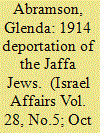

|
|
|
|
|
| Summary/Abstract |
Ahmed Djemal Pasha, Military Governor of the Levant during World War I, instigated two major deportations of Jews from Jaffa during the course of the war, and numerous lesser ones. On 17 December 1914, a day that came to be known as ‘Black Thursday’, the Ottoman ruler of Jaffa, under Djemal’s command, ordered the mass deportation of ‘enemy subjects’, including 6,000 Russian-born Jewish residents of Jaffa. Over the course of the next three months, a few thousand more Russian-born Jews were expelled from Palestine or fled just ahead of the deportations. In total 11,277 Jews were exiled, leaving on various ships that took them from Jaffa to Alexandria. This article describes the ‘Black Thursday’ deportation based on testimonies of those who either witnessed it or were its victims, and briefly on the two works of documentary fiction that provide a rounded context for the many accounts.
|
|
|
|
|
|
|
|
|
|
|
|
|
|
|
|
| 2 |
ID:
036645


|
|
|
|
|
| Publication |
London, WeidenFeld and Nicolson, 1978.
|
| Description |
xii, 628p.Hbk
|
| Standard Number |
0297772708
|
|
|
|
|
|
|
|
|
|
|
|
Copies: C:1/I:0,R:0,Q:0
Circulation
| Accession# | Call# | Current Location | Status | Policy | Location |
| 017661 | 923.25694/EBA 017661 | Main | On Shelf | General | |
|
|
|
|
| 3 |
ID:
123032
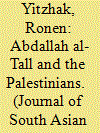

|
|
|
| 4 |
ID:
108370
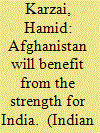

|
|
|
| 5 |
ID:
154052
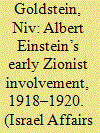

|
|
|
|
|
| Summary/Abstract |
This article presents the very beginning of Albert Einstein’s involvement on behalf of the Zionist movement. Although he was familiar with Zionist activists, it was only World War I and the rabid anti-Semitism attending it that led him to rediscover his affiliation with the Jewish people and to subscribe to the Zionist solution to their misery. Einstein tried to combine his support for the national Zionist ideals with the universal worldview to which he adhered from time immemorial, gradually coming to support establishment of the national home in Palestine as a solution for ‘The Jewish Problem’.
|
|
|
|
|
|
|
|
|
|
|
|
|
|
|
|
| 6 |
ID:
092105
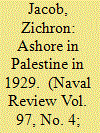

|
|
|
|
|
| Publication |
2009.
|
| Summary/Abstract |
This August marks the 80th anniversary of the Palestine Disturbances of 1929. From the institution of the British Mandate in 1922, the relationship between jews and Arabs had been relatively peaceful.
|
|
|
|
|
|
|
|
|
|
|
|
|
|
|
|
| 7 |
ID:
113988


|
|
|
|
|
| Publication |
2012.
|
| Summary/Abstract |
De-legitimization of the State of Israel is the current episode in a persistent genocidal project aimed at the Jews and, more profoundly, at the values inherent in Judaism and shared by civilized societies. Skirting the shame attached to anti-Semitism after the horrors of the Holocaust, contemporary advocates of the genocidal plot are given free rein to attack Jews by a combination of severe criticism of the State of Israel and well-meaning plans for its geopolitical future, i.e. the peace process. Ugly lies - the Jews stole the land from the Palestinians, Israel is an apartheid state - function like the age-old charges that justified persecution of the Jews as Christ killers. Beautiful lies - the two state solution that everyone knows - echo the proto-legalistic measures that gradually deprived European Jews of their rights, their strength, their resources and capacity to resist deportation and extermination. Americans, misinterpreting as a repetition of the 1930s the rise of violent anti-Semitism in Europe at the dawn of the twenty-first century, are unprepared to deal with a parallel rise in Muslim Brotherhood forces within the US. As brutal Islamic Jew hatred boils in an Arab-Muslim world revolting, reforming, and submitting to sharia law, the Obama administration conducts a policy of the outstretched hand and blindfolded eyes that leaves Iran free to develop the ultimate genocidal weapon. Israel is the bulwark, not only for Jews but for the free world. Clear thinking, uncompromising discourse, and resolute action - at the risk of being labelled extremist - can stop the genocidal project and, working backward, disarm the lies.
|
|
|
|
|
|
|
|
|
|
|
|
|
|
|
|
| 8 |
ID:
100678
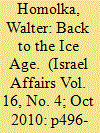

|
|
|
|
|
| Publication |
2010.
|
| Summary/Abstract |
Until well into the twentieth century, Jews and Christians had no mutual basis for discourse. The Christian-Jewish dialogue and the rapprochement between the Holy See and the State of Israel are owed in essence to feelings of shame regarding the Shoah. The Second Vatican Council and the pontificate of John Paul II signified substantial breakthroughs. Since then, though, the sense of guilt has eased, and the Roman Catholic Church's awareness of the injustice of its role as fellow traveller to, and henchman of, the Third Reich has diminished. Under the current Pope, Benedict XVI, the relationship between Jews and Catholics has noticeably deteriorated. After five years of his pontificate, Joseph Ratzinger has lost a great deal of trust, and not only among Jews.
|
|
|
|
|
|
|
|
|
|
|
|
|
|
|
|
| 9 |
ID:
133528
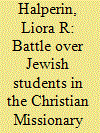

|
|
|
|
|
| Publication |
2014.
|
| Summary/Abstract |
Studies of Jewish students in Palestine's Christian missionary schools largely end at the close of the Ottoman period. But although a tiny and diminishing fraction of Jewish students studied in such schools after the First World War, the mandate period was marked by anxious and often zealous Zionist anti-missionary campaigns. The article considers this space of Jewish-Christian interaction, arguing that even as a Hebrew-dominant society took root, missionary schools provided education in European languages, particularly English, tools that offered advantages to Jewish students with an interest in clerical work or foreign study. The continuing appeal and importance of foreign language skills cast doubt on the Zionist pretence of a self-sufficient Hebrew society.
|
|
|
|
|
|
|
|
|
|
|
|
|
|
|
|
| 10 |
ID:
154063
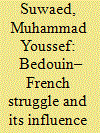

|
|
|
|
|
| Summary/Abstract |
The post-World War I partitioning of the Ottoman Empire, especially the League of Nations’ appointment of Britain and France as the mandatory powers for Palestine and Syria respectively, influenced the lives of the inhabitants of Upper Galilee. With the district left in December 1919 under French rule, the elated Christians began to avenge themselves on their long-time Bedouin opponents, who for their part supported the short-lived pan-Arab kingdom proclaimed in Damascus by Emir Faisal ibn Hussein of Mecca. With the Upper Galilee deteriorating into internecine strife, the Jews, perceived as supporters of the French, became a target for Bedouin attacks.
|
|
|
|
|
|
|
|
|
|
|
|
|
|
|
|
| 11 |
ID:
142756
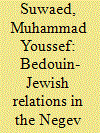

|
|
|
|
|
| Summary/Abstract |
On the foundation of the first Jewish settlements in the Negev, at the start of the 1940s, the Bedouins welcomed the Jewish settlers. The local personal connections and mutual acquaintance between them created a feeling of closeness. The symbiosis of daily life and mutual help in the fields of personal needs, from medicine to transport, replaced their mutual fears.
However, two factors quickly changed this attitude. The first was a severe drought, which struck the Negev in the winter of 1947, and brought with it a difficult economic situation, followed by several robberies and disputes, and damage to property. The second factor was the incessant encouragement given by the leaders of the Palestinian National Movement to the Bedouins to join the struggle against the Jewish population, especially after the UN decision in November 1947, that is, after the partition of Palestine and the inclusion of the Negev within the borders of the Jewish state.
Most of the Bedouins joined the Palestinian National Struggle. Friends of yesterday became today's enemies. The years 1947–1949 were a period of anarchy, which continued well into the 1950s. In this period the State of Israel was established. Consequently, the Jewish population in the Negev was no longer the party responsible for the relationship with the Bedouins, as the Israeli government took its place. Also contact between neighbors was reduced after the Bedouins were evacuated toward the ‘fence’ region, in the Beer-Sheva Valley. The freedom the Bedouins enjoyed before the war did not exist anymore.
|
|
|
|
|
|
|
|
|
|
|
|
|
|
|
|
| 12 |
ID:
092287


|
|
|
|
|
| Publication |
2009.
|
| Summary/Abstract |
This article explores the relations between the Catholic Church and the Jews from the middle of the previous century until the present day. It will focus on how the Catholic Church has dealt with memory of the Shoah and how this has affected the Church's relations with the Jews. It will look at the most recent developments in dialogue between the Church and the Jews under Pope Benedict XVI and the impact of his visit to Israel in May 2009.
|
|
|
|
|
|
|
|
|
|
|
|
|
|
|
|
| 13 |
ID:
137182
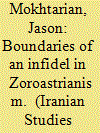

|
|
|
|
|
| Summary/Abstract |
This paper explores the Middle Persian term agdēn, which is often problematically translated as “infidel.” By tracing this term of otherness through Middle Persian texts such as legal cases in The Book of a Thousand Judgments and polemics in the Dēnkard Book III, this article argues that the concept of the infidel frequently appears in discussions about slavery, intermarriage, and conversion to and from Zoroastrianism. Middle Persian legal and theological texts regarding infidels deal with cases in which Zoroastrian interactions with non-Zoroastrians impinge upon Zoroastrian boundaries of identity. Moreover, the term agdēn often refers to Jews, Christians, and Muslims, thereby offering insight into the ties between Zoroastrian self-identity and other groups which the Persian priests encountered. In the end, this paper demonstrates the need for further intensive studies into Middle Persian technical terms of otherness as they lie at the heart of questions of Zoroastrian self-definition and attitudes towards others.
|
|
|
|
|
|
|
|
|
|
|
|
|
|
|
|
| 14 |
ID:
190054
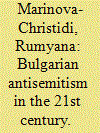

|
|
|
|
|
| Summary/Abstract |
This article examines the conceptual elements of antisemitism in Bulgaria today as well as the ways in which these concepts are communicated linguistically and visually. It seeks to provide an insight into different aspects of antisemitism – from direct manifestations to attempts at rewriting or distorting the history of Bulgaria’s Jewry. The IHRA definition is used for the identification of antisemitic manifestations, from classical stereotypes (power, greed, etc.) to more contemporary attributions (Israel-related antisemitism such as instrumentalisation of the Holocaust, Nazi analogy, denial of Israel’s right to exist).
|
|
|
|
|
|
|
|
|
|
|
|
|
|
|
|
| 15 |
ID:
125665
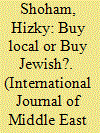

|
|
|
|
|
| Publication |
2013.
|
| Summary/Abstract |
The article explores the Zionist cultural economy in interwar Palestine, by studying the emergence of the field of consumption as an arena for political struggles among Jews and between Jews and Arabs. The Jewish nationalist movement employed dominant contemporary assumptions about economic nationalism in attempts to politicize the economy of British Palestine, including through campaigns advocating ethnonational separatism in consumption. Unlike other "buy local" movements around the world, these were not directed solely against imports; rather, they were often "buy Jewish" campaigns waged against the consumption of commodities produced by the rival ethnonational sector in Palestine. Using a variety of archival and media sources, the article tracks the development of Jewish separatist consumption campaigns in interwar Palestine, uncovering a gradual amplification of their ethnonational emphasis that paralleled the escalation of the Arab-Jewish conflict. The cultural mechanisms used to attribute ethnic qualities to objects and define them as either "Jewish" or "foreign" are analyzed with particular attention to the conceptual contradictions in the definitions of a Jewish product, which were shaped by economic conflicts and the diverse political conceptions of Jewish identity. The study of separatist consumption sheds new light on the "dual society" thesis, revealing the deep grip of separatist approaches across multiple layers of the Jewish middle class in the Yishuv.
|
|
|
|
|
|
|
|
|
|
|
|
|
|
|
|
| 16 |
ID:
124286
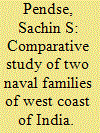

|
|
|
|
|
| Publication |
2013.
|
| Summary/Abstract |
Indian have always been known to have had maritime intercource extending beyond the countries of Persian Gulf and the Red sea. India had trading relations with the Phoenicians, Jews, Assyrians, Greeks, Egyptians and Romans.
|
|
|
|
|
|
|
|
|
|
|
|
|
|
|
|
| 17 |
ID:
094430
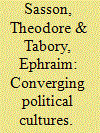

|
|
|
|
|
| Publication |
2010.
|
| Summary/Abstract |
We examine the impact of globalization on Israeli and American Jews' attitudes regarding religious pluralism and minority civil rights in Israel. Studying middle-class Israeli and American Jews of European descent, we find overlap across (and differentiation within) the groups. We attribute political cultural convergence to globalization: (1) international travel; (2) diffusion of Jewish transnational institutions; (3) increased integration of Israel into global capitalist relations; and (4) perceived security threats moving American Jews toward increased security concerns for themselves and Israel. We perceive new patterns of transnational engagement in which Israeli and American Jews seek common cause with their like-minded counterparts.
|
|
|
|
|
|
|
|
|
|
|
|
|
|
|
|
| 18 |
ID:
102832
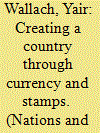

|
|
|
|
|
| Publication |
2011.
|
| Summary/Abstract |
Recent studies have examined the use of currency and stamps for nation-building in various contexts, with these artefacts seen as vehicles for indoctrination and gaining legitimacy by ruling elites - as a form of "banal nationalism". This article goes further to argue that in moments of geopolitical upheaval, these symbolic artefacts can play a crucial role in shaping the very framework of nationhood. This article focuses on the Middle East during World War I and its aftermath, and on British efforts to shape public opinion through the issuing of Palestine postage stamps and currency (1920-7), which were intended to convey Britain's commitment to Zionism. Parallels are drawn to the introduction of Arab stamps and flags during the Arab Revolt (1916-18). The benefit to Zionist nation-building and "Hebrew Revival" is discussed, as well as the strikingly different reactions of local constituencies - Arabs and Jews - to the political message of these symbolic objects.
|
|
|
|
|
|
|
|
|
|
|
|
|
|
|
|
| 19 |
ID:
113996
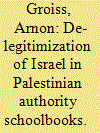

|
|
|
|
|
| Publication |
2012.
|
| Summary/Abstract |
De-legitimization of Israel as a sovereign state and denial of the Jews' rights, indeed of their legitimate presence in Palestine in both antiquity and today, have been the cornerstone of the Arab position since the onset of the Middle East conflict. Even the peace agreements between Israel and some of its neighbours - Egypt (1979), the PLO (1993), Jordan (1994) - have not changed this attitude, as starkly illustrated by schoolbooks of the nations concerned. This essay describes the depiction of the Jewish state in Palestinian Authority (PA) schoolbooks in comparison to Arab, Iranian, and Israeli textbooks.
|
|
|
|
|
|
|
|
|
|
|
|
|
|
|
|
| 20 |
ID:
111897
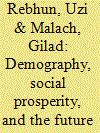

|
|
|
|
|
| Publication |
2012.
|
| Summary/Abstract |
The expanding recognition of the two-state solution for the Israeli-Palestinian conflict ostensibly removes an immediate demographic threat to Israel that the Arab inhabitants between the Mediterranean Sea and the Jordan River will soon outnumber the Jews. The demographic and social concern of maintaining the character of the State of Israel as the place where the Jewish people can realize their right to self-determination and can ensure a solid Jewish majority should be directed inward. Israel also wishes to continue to be a prosperous and developed country. This paper examines the changing proportions and characteristics of specific population subgroups and their effect on Israel's future as a Jewish and prosperous state. Further it argues that the demographic composition does not allow Israel to accept the demand for the 'right of return' whereas the two-state solution should involve the settlement of the Palestinian refugees in the new Palestinian state. The article discusses broader meanings of the demographic dimension for the Jewish and Arab populations in Israel.
|
|
|
|
|
|
|
|
|
|
|
|
|
|
|
|
|
|
|
|
|